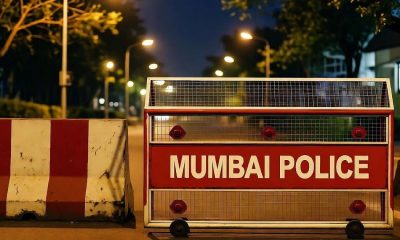Crime
Vandal runs riot in 489-year-old Portuguese-built Mumbai church cemetery
In a shocking incident, an unknown person sneaked inside the historic St Michael’s Church premises around dawn and vandalised 18 crosses in the graveyard of the 489-year-old church, near the Mahim station, officials of the Archdiocese of Bombay said here on Saturday.
According to the church’s Parish Priest, Fr. Bernard Lancy Pinto, the incident occurred around 6 a.m. when the unidentified miscreant entered the church premises and embarked on a damage-spree in the cemetery, sparking furious reactions among the Mumbai’s Catholic community.
“A FIR has been lodged at Mahim police station and investigations have begun. The police have assured us that they will arrest the person concerned based on the CCTV footage and the statement of witnesses,” he said.
He said the police have promised appropriate legal action against the vandal and they will also conduct a probe to check for any security lapses.
“It is regrettable and painful that the graves of the Catholics were vandalised at the St Michael’s Church. The sentiments of the community are deeply hurt as this act not only involved the destruction of religious objects but also disrespect for the dead,” said an Archdiocese spokesperson this evening.
“While the Church appreciates the support and assistance of various groups, we strictly do not wish to give this act a communal overtone. The police are investigating the incident and we remain hopeful that the perpetrator of this vicious crime will be brought to task,” the spokesperson added.
The St. Michael’s Church is the oldest Portuguese-built church in 1534 in its former colony of isles and the then sea-trading centre known as ‘Bom Bahia’ (later Bombay).
127 years later in May 1661, when Britain’s King Charles II married Princess Catherine of Braganza, the daughter of Portugal’s King John IV, ‘Bom Bahia’ was transferred to her husband as part of her wedding dowry.
The Mahim Church is famed for its Wednesday ‘novenas’ where people from all religions flock to attend and pray for miracles that are believed to take place.
The Catholic community in Mumbai and elsewhere has reacted sharply to the vandalism in Mahim Church and urged the police and government to take prompt action in the matter, besides ensuring security for the 125-odd churches in the city.
Many Christians – who number around 500,000 (or 3.30 per cent) of the city’s population – penned their sense of agony and outrage on social media posts, and recalled similar but smaller incidents of vandalism, theft of valuable church properties, etc, that have occurred in the past few years in different parts of Mumbai against the peace-loving community.
Saturday’s development came barely a day after the BrihanMumbai Municipal Corporation revoked a move to acquire a part of the cemetery besides the St Peter’s Church in Bandra west, for a road widening project, after Catholics from Mumbai raised an outcry and intervention of some local political leaders.
Crime
CBI books CGST officer Ratiram Meena for amassing disproportionate assets

Jaipur, Nov 1: The Central Bureau of Investigation (CBI) has registered a case against Central Goods and Services Tax (CGST) Department Assistant Commissioner, Ratiram Meena, on charges of possessing assets disproportionate to his known sources of income.
According to officials, Meena had declared assets worth Rs 51.73 lakh as of August 2018. However, by August 2025, his wealth had increased to over Rs 4.08 crore, marking an eightfold rise in just seven years.
The CBI revealed that Meena served in CGST offices in Jaipur and Ahmedabad during this period. The investigation found that he allegedly acquired illegal assets worth Rs 2.54 crore, which is nearly 100 per cent more than his known income.
CBI sources said Meena allegedly operated several firms, LLPs, and companies under the names of his wife and son, which were used to divert and conceal illegal funds. Raids were conducted at multiple locations, including Jaipur, Ankleshwar (Gujarat), and Ahmedabad, leading to the recovery of gold and silver jewellery worth approximately Rs 35 lakh. Investigators also found that Meena and his family owned multiple immovable properties across Rajasthan, along with luxury vehicles such as a Porsche and a Jeep Compass.
Two bank lockers in the names of family members were also discovered, and the CBI is currently examining their contents. The case surfaced after the disproportionate asset-to-income ratio of the officer failed to be justified during a routine assessment. As per legal provisions, if a government officer possesses assets significantly exceeding their known income without a legitimate explanation, it is considered a case of illegal acquisition of wealth.
The CBI has launched a detailed investigation into Meena’s financial transactions, company records, locker contents, vehicle purchases, and property documents to trace the origin of the illicit assets.
Crime
Navi Mumbai: 2 Sentenced To Life Imprisonment In 2020 Rabale MIDC Murder Case

Navi Mumbai: The Additional District and Sessions Judge at Belapur has sentenced two accused to life imprisonment in connection with a 2020 murder case that occurred under the jurisdiction of the Rabale MIDC police station. The convicts have been identified as Jisat alias Jisan Siddiqui and Lakshmi Rupesh Waghe.
Investigation revealed that Lakshmi Waghe was in an illicit relationship with Jisan, and together they conspired to murder her husband, Rupesh Waghe, who had become an obstacle in their affair.
Lakshmi Waghe, a resident of the Rabale MIDC area, was living with Jisan Siddiqui, with whom she shared an extramarital relationship. Frequent quarrels over this issue led to Lakshmi and her husband living separately. In January 2020, Rupesh visited his wife’s house to meet their daughter and discovered that she was living with Jisan. Angered, he confronted Lakshmi, which enraged both her and Jisan. The duo first assaulted him with fists and kicks, after which Lakshmi attacked Rupesh on the head and limbs with an iron sickle. Jisan then threw a cement block at Rupesh, attempting to kill him.
Rupesh sustained severe injuries and was admitted to JJ Hospital in Mumbai for treatment, where he succumbed to his injuries during treatment. Following the incident, the Rabale MIDC police registered a case against Lakshmi Waghe and her lover Jisan alias Jisan Siddiqui under Sections 302 (murder), 307 (attempt to murder), 34 (common intention) of the Indian Penal Code, along with Sections 4 and 25 of the Arms Act, and arrested both the accused.
Then Police Inspector Anil Patil investigated the case and submitted the charge sheet to the Belapur Sessions Court. The trial was conducted in the court of Additional District and Sessions Judge P. A. Sane. During the hearing, Special Public Prosecutor Yogendra Patil presented strong arguments and credible witness evidence, which the court accepted. On October 28, the court convicted both accused and sentenced them to life imprisonment, along with a fine of Rs 500 each, and in default, one month of simple imprisonment.
Senior Police Inspector Sunil Waghmare and Crime PI Kalpana Jadhav supervised the case. Police Sub-Inspector Ghodke (paravi officer), Court Constable S.N. Kamble, Rajesh Salgar, and Police Constable S.T. Shinde played key roles in ensuring the conviction through their dedicated efforts.
Crime
Navi Mumbai: 70-Year-Old NRI From London Arrested For Raping & Molesting 10-Year-Old Girl

Navi Mumbai: A 70-year-old NRI from London, who enjoys a pension of 4000 pounds by the US government post retirement as a taxi driver there, has been arrested by the Anti Human Trafficking Unit (AHTU) of Navi Mumbai along with a lady whose 10-year-old daughter was frequently raped and molested by the NRI.
According to police, the NRI used to buy them monthly groceries and helped them rent out a house against a heavy deposit, due to which the mother used to force her daughter to stay with the accused man during his every visit to India. He was arrested after an early morning raid at his house at Taloja on Friday.
The arrested accused has been identified as Farooq Allauddin Shaikh (70), originally from Puducherry but currently residing in London with his family. Two years ago, Shaikh had purchased a flat in Sector 20, Taloja, and would visit every few months for a few days. Shaikh is settled in the US with his wife and three children- all married. His two daughters work with a solicitor in the US, while his son, who got married recently, is settled in Bangkok. “One of his daughters also has a 10-year-old daughter, and the victim whom we rescued is also a 10-year-old girl,” a police officer who is a part of the investigation said.
While he had also visited India in the month of August for a few days, this time, he came on October 25. And after coming, he purchased groceries for the house of the victim. As per the investigations till now, the accused had started sexually abusing the victim along with another 15-year-old girl known to the victim, around two years back. He had helped the family of the 10-year-old to procure a house on rent against a deposit of Rs 2.5 lakh.
The AHTU received information from a reliable source regarding the sexual abuse that had happened with the girl in his flat, following which the team decided to raid the flat. “We got to know that the girl was sent to his flat on Monday and Tuesday.
On Wednesday, she celebrated her birthday at his flat and on Thursday night again, the mother dropped the child off at his flat. She was supposed to come pick up the child at 7 am when she brings breakfast for the accused, and hence we had to raid the flat before that, and we planned the raid at 5 am,” the officer added. Senior Police Inspector Prithviraj Ghorpade, Assistant Police Inspector Yogesh Deshmukh, and officers Nilam Pawar and Sarita Gude raided Shaikh’s flat on Thursday morning and rescued the child.
The police found four sex toys and Viagra pills in his cupboard, and one sex toy on the dressing table. They also found bottles of liquor, which the victim claimed that she was made to drink every time he abused her. The accused had become acquainted with the victim’s mother, who worked as a domestic help in the building and started offering monetary ‘helps’ in return for having her daughter at his flat. Whenever Shaikh visited India, the woman would send her 10-year-old daughter to his flat under the pretext of playing, police said.
“Both, the mother and the man, have been produced before the court and remanded to police custody till November 4,” senior police inspector Pravin Bhagat from Taloja police station said. The child has now been handed over to the Child Welfare Committee (CWC). Both the accused have been booked under Section of BNS and POCSO.
-

 Crime3 years ago
Crime3 years agoClass 10 student jumps to death in Jaipur
-

 Maharashtra1 year ago
Maharashtra1 year agoMumbai Local Train Update: Central Railway’s New Timetable Comes Into Effect; Check Full List Of Revised Timings & Stations
-

 Maharashtra1 year ago
Maharashtra1 year agoMumbai To Go Toll-Free Tonight! Maharashtra Govt Announces Complete Toll Waiver For Light Motor Vehicles At All 5 Entry Points Of City
-

 Maharashtra1 year ago
Maharashtra1 year agoFalse photo of Imtiaz Jaleel’s rally, exposing the fooling conspiracy
-

 National News1 year ago
National News1 year agoMinistry of Railways rolls out Special Drive 4.0 with focus on digitisation, cleanliness, inclusiveness and grievance redressal
-

 Maharashtra12 months ago
Maharashtra12 months agoMaharashtra Elections 2024: Mumbai Metro & BEST Services Extended Till Midnight On Voting Day
-

 National News1 year ago
National News1 year agoJ&K: 4 Jawans Killed, 28 Injured After Bus Carrying BSF Personnel For Poll Duty Falls Into Gorge In Budgam; Terrifying Visuals Surface
-

 Crime1 year ago
Crime1 year agoBaba Siddique Murder: Mumbai Police Unable To Get Lawrence Bishnoi Custody Due To Home Ministry Order, Says Report






















